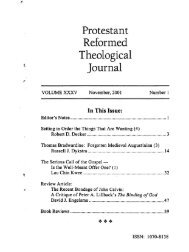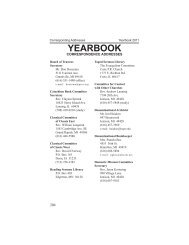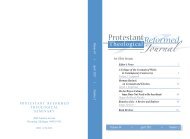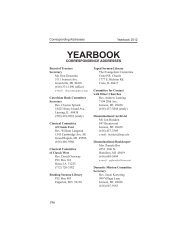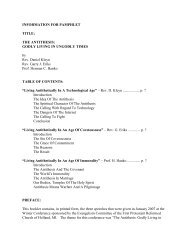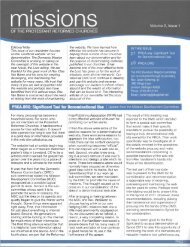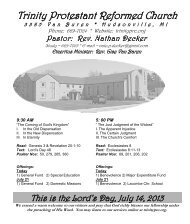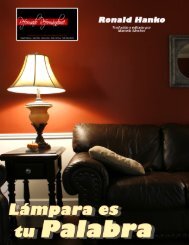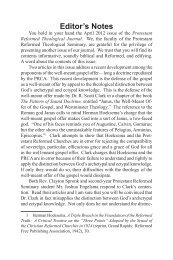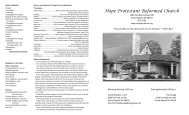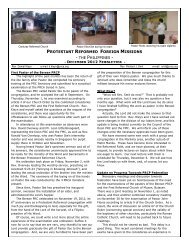November 2007 - Protestant Reformed Churches in America
November 2007 - Protestant Reformed Churches in America
November 2007 - Protestant Reformed Churches in America
Create successful ePaper yourself
Turn your PDF publications into a flip-book with our unique Google optimized e-Paper software.
<strong>in</strong>g <strong>in</strong> this text” (p. 63).<br />
Calv<strong>in</strong>’s statements admittedly<br />
raise some questions, but there<br />
is a way to understand them that<br />
does not compromise the truth<br />
of forensic justification. When<br />
Calv<strong>in</strong> says that Paul m<strong>in</strong>gles<br />
free pardon and renewal, he<br />
does not mean that Paul teaches<br />
that works are sometimes <strong>in</strong>volved<br />
<strong>in</strong> our justification.<br />
Rather, he means that Paul mentions<br />
both justification and renewal<br />
at the same time, even<br />
though God’s act of freely pardon<strong>in</strong>g<br />
our s<strong>in</strong>s on the one hand<br />
and God’s act of renew<strong>in</strong>g us to<br />
obey Him on the other are dist<strong>in</strong>ct<br />
acts. Calv<strong>in</strong>’s doctr<strong>in</strong>e of<br />
forensic justification is not<br />
compromised by his explanation<br />
of Titus 3:7, as Lillback<br />
implies it is.<br />
Both Luther and Calv<strong>in</strong><br />
taught forensic justification.<br />
Neither Luther nor Calv<strong>in</strong><br />
m<strong>in</strong>gled justification and renewal<br />
<strong>in</strong> such a way that works<br />
were allowed to play a part <strong>in</strong><br />
justification. Lillback’s determ<strong>in</strong>ed<br />
effort to f<strong>in</strong>d otherwise<br />
<strong>in</strong> the Reformers is om<strong>in</strong>ous.<br />
Book Reviews<br />
After all, if the Reformers could<br />
allow for justification by faith<br />
and works, then <strong>Reformed</strong> and<br />
Presbyterian churches today<br />
may allow for it as well.<br />
The rest of the articles <strong>in</strong> the<br />
book have similar weaknesses.<br />
This is not to say that the men<br />
never make soundly <strong>Reformed</strong><br />
statements; they make many.<br />
This is not to say, either, that the<br />
articles are not valuable studies<br />
with helpful <strong>in</strong>sights on <strong>in</strong>terest<strong>in</strong>g<br />
topics; they are. There<br />
are articles on the relationship<br />
between justification and<br />
eschatology, union with Christ<br />
and justification, the pastoral<br />
implications of justification,<br />
and more. But it is to say that<br />
at key po<strong>in</strong>ts, allowance is made<br />
for works to play a part <strong>in</strong> justification.<br />
This guts the whole<br />
project, and compromises the<br />
truth of justification by faith<br />
alone.<br />
So, what is the status of the<br />
doctr<strong>in</strong>e of justification at<br />
Westm<strong>in</strong>ster Theological Sem<strong>in</strong>ary<br />
<strong>in</strong> Philadelphia The sem<strong>in</strong>ary<br />
rema<strong>in</strong>s firmly rooted <strong>in</strong> its<br />
history. ■<br />
<strong>November</strong> <strong>2007</strong> 121



